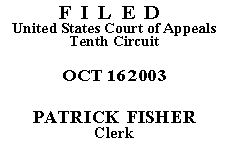

| In re:
PHYLLIS L. CROWDER, Debtor.
CATALINA DEVELOPMENT, INC.; SANTA TERESA COUNTRY CLUB, LLC, Appellants, v. BERNARD R. GIVEN, II, Trustee, Appellee. |
|
In this bankruptcy appeal, appellants Catalina Development, Inc. (Catalina) and Santa Teresa Country Club, LLC (Country Club) challenge the bankruptcy court's decision to exclude parol evidence, after concluding Catalina's agreement with debtor Phyllis Crowder to settle its claims against her bankruptcy estate was not ambiguous. Reviewing the bankruptcy court's legal conclusions de novo, see, e.g., Connolly v. Harris Trust Co. (In re Miniscribe Corp.), 309 F.3d 1234, 1240 (10th Cir. 2002), we affirm.
In the letter agreement between Catalina and Crowder, Catalina agreed to assume "all accounts payable now on the books of Santa Teresa Country [Club] which were contracted in the ordinary course of business." Aplt. App. at 9. The parties do not dispute that the Country Club's books clearly indicated that the Club owed El Paso Electric Company $951,387, and that this was a debt incurred through the ordinary course of business. Catalina, however, asserts that it did not intend to assume liability for that debt but, instead, intended only to assume the $134,787 accounts payable listed in Crowder's bankruptcy schedules, separate from the electric bill. See id. at 15, 16.
The parties agree that New Mexico contract law governs this dispute. New Mexico's parol evidence rule precludes a party from introducing evidence extrinsic to the contract "for the purpose of construing the contract in a manner that varies or contradicts the clear and unambiguous language of the writing." C.R. Anthony Co. v. Loretto Mall Partners, 817 P.2d 238, 241 (N.M. 1991). Nonetheless, "in determining whether a term or expression to which the parties have agreed is unclear, a court may hear evidence of the circumstances surrounding the making of the contract and of any relevant usage of trade, course of dealing, and course of performance." Id. at 242-43 (footnote omitted). Contrary to appellants' assertion, however, the bankruptcy court here did consider their extrinsic evidence for the preliminary purpose of determining whether the contract's language was ambiguous.
Nonetheless, after hearing this extrinsic evidence, the bankruptcy court concluded that the letter agreement's language was not ambiguous. That decision is a legal conclusion, see id. at 243, with which we agree. We will consider an agreement's language to be ambiguous if "the contract is reasonably and fairly susceptible of different constructions." Mark V, Inc. v. Mellekas, 845 P.2d 1232, 1235 (N.M. 1993).
In determining the existence of an ambiguity, the language at issue should be considered not from the viewpoint of a lawyer, . . . but from the standpoint of a reasonably intelligent lay[person], viewing the matter fairly and reasonably, in accordance with the usual and natural meaning of the words, and in the light of existing circumstances, prior to and contemporaneous with the making of the [contract].
Rummel v. Lexington Ins. Co., 945 P.2d 970, 976 (N.M. 1997) (quotation omitted). Here, the letter agreement's language clearly linked the relevant accounts payable to those shown on the Country Club's books. Although Catalina's president testified that he was, instead, relying on the Country Club's accounts payable listed on Crowder's bankruptcy schedules, separate from the electric bill, "a party's statements of unilateral, subjective intent, without more, are insufficient to establish ambiguity in light of clear contract language," Ponder v. State Farm Mut. Auto. Ins. Co., 12 P.3d 960, 965 (N.M. 2000).
The bankruptcy court, therefore, properly considered appellants' extrinsic evidence in determining the letter agreement was not ambiguous, and then appropriately declined to admit that extrinsic evidence to the extent it contradicted that agreement. See C.R. Anthony Co., 817 P.2d at 243 n.4. The judgment of the district court, upholding the bankruptcy court's ruling, is, therefore, AFFIRMED.
Entered for the Court
Circuit Judge
*. This order and judgment is not binding precedent, except under the doctrines of law of the case, res judicata, and collateral estoppel. The court generally disfavors the citation of orders and judgments; nevertheless, an order and judgment may be cited under the terms and conditions of 10th Cir. R. 36.3.